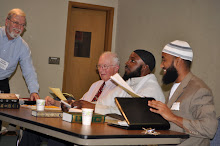Times Writers Group: Leave religion out of workplace
By Vicki Ikeogu • November 6, 2008
Read Comments(70)
Buzz up! The Equal Employment Opportunity Commission founded under Title VII of the Civil Rights Act of 1964 forbids discrimination against race, color, religion, sex, or national origin. The EEOC also states an employer must make reasonable accommodations for an employee’s religious practices, provided they do not make any hardships for the conduct of business.
But what may be considered accommodations to some seem like religious preferential treatment to me. Case in point, the Gold’n Plump Poultry plant in Cold Spring.
Gold’n Plump has been the hot topic of the EEOC recently. According to a St. Cloud Times report “Prayer leads to disputes in workplaces nationwide,” some workers at the plant, mainly Somali immigrants, argue that they aren’t allowed time to pray, a fundamental part of their religious beliefs. Some have gone as far as to file a lawsuit against the company, saying that the plant is violating their religious civil rights clearly defined under the EEOC.
In an attempt to reach a settlement, Gold’n Plump decided to alter its break schedules. Instead of workers given the usual 15-minute break, the company has chosen to give their employees two 10-minute breaks to better accommodate Muslim prayer.
While this may be seen as “reasonable” in an attempt to address religious intolerance, other employees of different religions seem to be overlooked.
The EEOC was developed to protect the civil rights of all employees and to prevent employers from judging a worker based on the individual’s race, sex, or religion. It was designed to give all employees equal treatment and protection from discrimination in the workplace.
In the case of Gold’n Plump, it seems to have done just the opposite.
While the intent may have been to protect Muslims from religious intolerance, the adjustment caused religious preferential treatment. By being forced into a situation where it has to change around breaks for everyone, the company is accommodating one religious group. And the EEOC overlooked a big part of what it stands for — justice for all employees.
According to EEOC policy: “Nothing … shall be interpreted to require any employer … to grant preferential treatment to any individual or to any group because of race, color, religion, sex or national origin of such individual or group on account of an imbalance which may exist with respect to the total number … employed …”
Other employees’ faiths have been overlooked in the case of Gold’n Plump. While it may be that the Muslim faith dictates prayer five times a day, other beliefs have their worship time, too.
People of different religions have to work on days reserved for worship, like Saturdays for Jews and Sundays for Christians. Places like Gold’n Plump, which operate on Sunday nights, couldn’t possibly allow accommodations for the Christians who work there to start at midnight.
Granted, this may seem unreasonable but when you enter the workplace, religion should not be an issue. You come to work to do what is expected of you in your job. When given an interview at a company, you are told what is to be expected of you. You are given a pay scale, job duties and told about break times. If you have problems with any of these conditions, you can turn down the job and look for another one.
Once you’re hired you know what you are getting yourself into. If you are required to remain at the production line until given permission to go on break, then you better stay there.
When you leave your job, you not only hurt the company, but your peers are left picking up your slack. Does that seem fair?
Certainly, the workplace should remain unbiased toward any religion.
In the case of Gold’n Plump, having breaks coincide with religious prayer time gives one group preferential treatment over others.
Unless they are willing to accommodate every employee’s beliefs, there should be no place for religion in the workplace.
This is the opinion of Vicki Ikeogu, whose column is published the first Thursday of the month.
Subscribe to:
Post Comments (Atom)


















































No comments:
Post a Comment